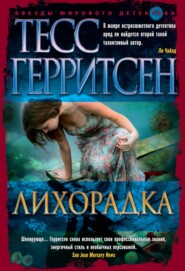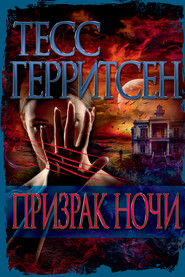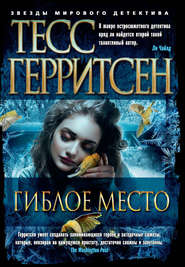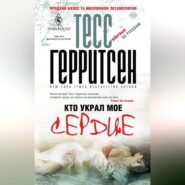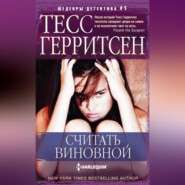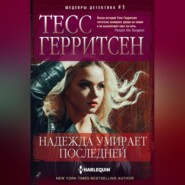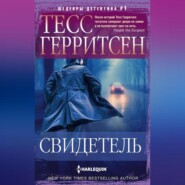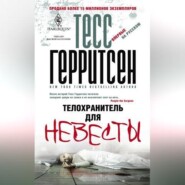По всем вопросам обращайтесь на: info@litportal.ru
(©) 2003-2024.
✖
In Their Footsteps
Автор
Год написания книги
2019
Настройки чтения
Размер шрифта
Высота строк
Поля
“Don’t come any closer!” hissed Beryl over her shoulder.
“Are you all right?” came the anxious inquiry. It was a man’s voice, pleasantly baritone. American?
“I’m fine,” snapped Beryl.
“What about your horse?”
Murmuring softly to Froggie, Beryl knelt down and ran her hands along Froggie’s foreleg. The delicate bones all seemed to be intact.
“Is he all right?” said the man.
“It’s a she,” answered Beryl. “And yes, she seems to be just fine.”
“I really can tell the difference,” came the dry response. “When I have a view of the essential parts.”
Suppressing a smile, Beryl straightened and turned to look at the man. Dark hair, dark eyes, she noted. And the definite glint of humor—nothing stiff-upper-lip about this one. Forty plus years of laughter had left attractive creases about his eyes. He was dressed in formal black tie, and his broad shoulders filled out the tuxedo jacket quite impressively.
“I’m sorry about the spill,” he said. “I guess it was my fault.”
“This is a country road, you know. Not exactly the place to be speeding. You never can tell what lies around the bend.”
“So I’ve discovered.”
Froggie gave her an impatient nudge. Beryl stroked the horse’s neck, all the time intensely aware of the man’s gaze.
“I do have something of an excuse,” he said. “I got turned around in the village back there, and I’m running late. I’m trying to find some place called Chetwynd. Do you know it?”
She cocked her head in surprise. “You’re going to Chetwynd? Then you’re on the wrong road.”
“Am I?”
“You turned off a half mile too soon. Head back to the main road and keep going. You can’t miss the turn. It’s a private drive, flanked by elms—quite tall ones.”
“I’ll watch for the elms, then.”
She remounted Froggie and gazed down at the man. Even viewed from the saddle, he cut an impressive figure, lean and elegant in his tuxedo. And strikingly confident, not a man to be intimidated by anyone—even a woman sitting astride nine hundred muscular pounds of horseflesh.
“Are you sure you’re not hurt?” he asked. “It looked like a pretty bad fall to me.”
“Oh, I’ve fallen before.” She smiled. “I have quite a hard head.”
The man smiled, too, his teeth straight and white in the twilight. “Then I shouldn’t worry about you slipping into a stupor tonight?”
“You’re the one who’ll be slipping into a stupor tonight.”
He frowned. “Excuse me?”
“A stupor brought on by dry and endless palaver. It’s a distinct possibility, considering where you’re headed.” Laughing, she turned the horse around. “Good evening,” she called. Then, with a farewell wave, she urged Froggie into a trot through the woods.
As she left the road behind, it occurred to her that she would get to Chetwynd before he did. That made her laugh again. Perhaps Bastille Day would turn out more interesting than she’d expected. She gave the horse a nudge of her boot. At once Froggie broke into a gallop.
RICHARD WOLF stood beside his rented M.G. and watched the woman ride away, her black hair tumbling like a horse’s mane about her shoulders. In seconds she was gone, vanished from sight into the woods. He never even caught her name, he thought. He’d have to ask Lord Lovat about her. Tell me, Hugh. Are you acquainted with a black-haired witch tearing about your neighborhood? She was dressed like one of the village girls, in a frayed shirt and grass-stained jodhpurs, but her accent bespoke the finest of schools. A charming contradiction.
He climbed back into the car. It was almost sixthirty now; that drive from London had taken longer than he’d expected. Blast these backcountry lanes! He turned the car around and headed for the main road, taking care this time to slow down for curves. No telling what might be lurking around the bend. A cow or a goat.
Or another witch on horseback.
I have quite a hard head. He smiled. A hard head, indeed. She slips off the saddle—bump—and she’s right back on her feet. And cheeky to boot. As if I couldn’t tell a mare from a stallion. All I needed was the right view.
Which he certainly had had of her. There was no doubt whatsoever that it was the female of the species he’d been looking at. All that raven hair, those laughing green eyes. She almost reminds me of…
He suppressed the thought, shoved it into the quicksand of bad memories. Nightmares, really. Those terrible echoes of his first assignment, his first failure. It had colored his career, had kept him from ever again taking anything for granted. That was the way one should operate in this business. Check the facts, never trust your sources, and always, always watch your back.
It was starting to wear him down. Maybe I should kick back and retire early. Live the quiet country life like Hugh Tavistock. Of course Tavistock had a title and estate to keep him in comfort, though Richard had to laugh when he thought of the rotund and balding Hugh Tavistock as earl of anything. Yeah, I should just settle down on those ten acres in Connecticut. Declare myself Earl of Whatever and grow cucumbers.
But he’d miss the work. Those delicious whiffs of danger, the international chess game of wits. The world was changing so fast, and you didn’t know from day to day who your enemies were…
He spotted, at last, the turnoff to Chetwynd. Flanked by majestic elms, it was as the black-haired woman had described it. That impressive driveway was more than matched by the manor house standing at the end of the road. This was no mere country cottage; this was a castle, complete with turrets and ivy-covered stone walls. Formal gardens stretched out for acres, and a brick path led to what looked like a medieval maze. So this was where old Hugh Tavistock had repaired to after those forty years of service to queen and country. Earldom must have its benefits—one certainly didn’t acquire this much wealth in government service. And Hugh had struck him as such a down-to-earth fellow! Not at all the country nobleman type. He had no airs, no pretensions; he was more like some absentminded civil servant who’d wandered, quite by accident, into MI6’s inner sanctum.
Amused by the grandeur of it all, Richard went up the steps, breezed through the security gauntlet, and walked into the ballroom.
Here he saw a number of familiar faces among the dozens of guests who’d already arrived. The London economic summit had drawn in diplomats and financiers from across the continent. He spotted at once the American ambassador, swaggering and schmoozing like the political appointee he was. Across the room he saw a trio of old acquaintances from Paris. There was Philippe St. Pierre, the French finance minister, deep in conversation with Reggie Vane, head of the Paris Division, Bank of London. Off to the side stood Reggie’s wife, Helena, looking ignored and crabby as usual. Had Richard ever seen that woman look happy?
A woman’s loud and brassy laugh drew Richard’s attention to another familiar figure from his Paris days—Nina Sutherland, the ambassador’s widow, shimmering from throat to ankle in green silk and bugle beads. Though her husband was long dead, the old gal was still working the crowd like a seasoned diplomat’s wife. Beside her was her twenty-year-old son, Anthony, rumored to be an artist. In his purple shirt, he cut just as flashy a figure as his mother did. What a resplendent pair they were, like a couple of peacocks! Young Anthony had obviously inherited his ex-actress mother’s gene for flamboyance.
Judiciously avoiding the Sutherland pair, Richard headed to the buffet table, which was graced with an elaborate ice sculpture of the Eiffel Tower. This Bastille Day theme had been carried to ridiculous extremes. Everything was French tonight: the music, the champagne, the tricolors hanging from the ceiling.
“Rather makes one want to burst out singing the ‘Marseillaise,’ doesn’t it?” said a voice.
Richard turned and saw a tall blond man standing beside him. Slenderly built, with the stamp of aristocracy on his face, he seemed elegantly at ease in his starched shirt and tuxedo. Smiling, he handed a glass of champagne to Richard. The chandelier light glittered in the pale bubbles. “You’re Richard Wolf,” the man said.
Richard nodded, accepting the glass. “And you are…?”
“Jordan Tavistock. Uncle Hugh pointed you out as you walked into the room. Thought I’d come by and introduce myself.”
The two men shook hands. Jordan’s grip was solid and connected, not what Richard expected from such smoothly aristocratic hands.
“So tell me,” said Jordan, casually picking up a second glass of champagne for himself, “which category do you fit into? Spy, diplomat or financier?”
Richard laughed. “I’m expected to answer that question?”
“No. But I thought I’d ask, anyway. It gets things off to a flying start.” He took a sip and smiled. “It’s a mental exercise of mine. Keeps these parties interesting. I try to pick up on the cues, deduce which ones are with Intelligence. And half of these people are. Or were.” Jordan gazed around the room. “Think of all the secrets contained in all these heads—all those little synapses snapping with classified data.”
“You seem to have more than a passing acquaintance with the business.”
“When one grows up in this household, one lives and breathes the game.” Jordan regarded Richard for a moment. “Let’s see. You’re American…”
“Correct.”






